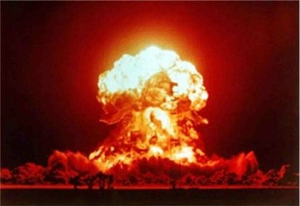Nuclear proliferationExperts: stronger regulation of military, civilian nuclear programs required
All nuclear energy and weapons programs should be independently regulated and subject to rigorous peer review, according to three experts on nuclear policy who held high office in different U.S. administrations; they note that despite international diplomatic efforts to prevent the proliferation of nuclear weapons and ensure that nuclear material is protected against theft, there is growing apprehension about terrorists acquiring weapons or nuclear material

Concerns increase over less control over nuclear proliferation // Source: wikia.com
All nuclear energy and weapons programs should be independently regulated and subject to rigorous peer review, according to three experts on nuclear policy. Their comments and recommendations are published in an article entitled “A Safer Nuclear Enterprise” in the 8 June issue of the journal Science.
The authors noted that, despite international diplomatic efforts to prevent the proliferation of nuclear weapons and ensure that nuclear material is protected against theft, there is growing apprehension about terrorists acquiring weapons or nuclear material.
“There is growing risk of accidents, mistakes or miscalculations, and of regional wars or nuclear terrorism,” wrote Sidney Drell, George P. Shultz, and Steven P. Andreasen. “Strong, independent regulatory agencies are not the norm in many countries.”
A Stanford University release reports that the three authors are leading experts on global nuclear issues, who have also held top policy positions at the White House. Drell, a senior fellow at the Hoover Institution and professor emeritus of theoretical physics at the SLAC National Accelerator Laboratory at Stanford University, served on the President’s Intelligence Advisory Board from 1993 to 2001.
Shultz, a distinguished fellow at the Hoover Institution and member of the Shultz-Stephenson Task Force on Energy Policy at Stanford, was U.S. Secretary of State during the Reagan administration.
Andreasen, a lecturer at the Humphrey School of Public Affairs at the University of Minnesota, was director for defense policy and arms control on the White House National Security Council from 1993 to 2001. He is a consultant to the Nuclear Threat Initiative in Washington, D.C.
“No nation is immune from risks involving nuclear weapons and nuclear power,” they wrote. “Since 1945 there have been more than 30 acknowledged serious accidents involving U.S. nuclear weapons. The United States has had an admirable safety record in civil nuclear power since the 1979 Three Mile Island accident, yet some reactors have a short window for restoring power following an accident. The Fukushima disaster [in Japan] demonstrates the urgent need to address this issue.”
To reduce the risks of nuclear accidents and terrorism, the authors recommended that every country involved in nuclear energy and weapons development establish a system of independent regulation and peer review.
“States new to the nuclear enterprise may not have effective safeguards to secure nuclear weapons and materials or the capability to safely manage and regulate civil reactors,” they noted.
Strengthening the United Nations International Atomic Energy Agency (IAEA) and increasing its budget so that it can play a greater role in civil nuclear safety and security would help reduce risks.
“In the United States, the nuclear regulatory system — in particular, the Nuclear Regulatory Commission (NRC) – is credited with setting a high standard for independent regulation of the civil nuclear power sector,” they wrote. “But careful attention is required to protect against regulatory capture by vested interests in government and industry; the latter funds a high percentage of the NRC budget.”
The authors also urged adoption of U.S.-style of independent peer review.
“Independent experts in the United States, both within and outside the weapons program, review each other, rigorously challenge weapons and systems safety, and communicate these points up and down the line,” they wrote. “The Institute of Nuclear Power Operations provides peer review and oversight of the U.S. civil nuclear sector. Its global counterpart, the World Association of Nuclear Operators, should further strengthen its safety operations, in particular its peer-review process. Enhanced capacity to arrange fines could also help states develop the culture of quality needed to achieve a superior safety record.”
The release notes that the authors called for improved dialogue between the military and nuclear energy communities, and greater public awareness and involvement in nuclear issues.
Ultimately, they would like to see a global effort to eliminate all nuclear weaponry. “Progress toward a world free of nuclear weapons will build international trust and cooperation required to address dangers and prevent catastrophes,” they wrote.
— Read more in Sidney D. Drell1, George P. Shultz, and Steven P. Andreasen, “A Safer Nuclear Enterprise,” Science 336, no. 6086 (8 June 2012): 1236 (DOI: 10.1126/science.1221842)
